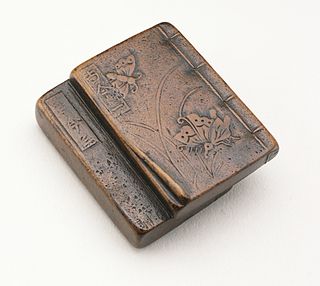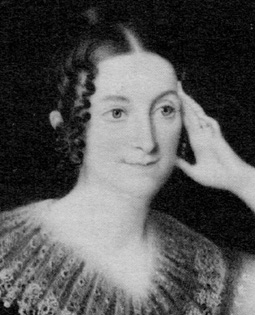Related Research Articles

Ceridwen or Cerridwen was an enchantress in Welsh medieval legend. She was the mother of a hideous son, Mordfran, and a beautiful daughter, Creirwy. Her husband was Tegid Foel and they lived near Bala Lake in north Wales. Medieval Welsh poetry refers to her as possessing the cauldron of poetic inspiration (Awen) and the Tale of Taliesin recounts her swallowing her servant Gwion Bach who is then reborn through her as the poet Taliesin. Ceridwen is regarded by many modern pagans as the Celtic goddess of rebirth, transformation, and inspiration.

Taliesin was an early Brittonic poet of Sub-Roman Britain whose work has possibly survived in a Middle Welsh manuscript, the Book of Taliesin. Taliesin was a renowned bard who is believed to have sung at the courts of at least three kings.

Welsh writing in English, is a term used to describe works written in the English language by Welsh writers.

Dame Carol Ann Duffy is a Scottish poet and playwright. She is a professor of contemporary poetry at Manchester Metropolitan University, and was appointed Poet Laureate in May 2009, and her term expired in 2019. She was the first female poet, the first Scottish-born poet and the first openly lesbian poet to hold the Poet Laureate position.

William Shakespeare (1564–1616) wrote sonnets on a variety of themes. When discussing or referring to Shakespeare's sonnets, it is almost always a reference to the 154 sonnets that were first published all together in a quarto in 1609. However, there are six additional sonnets that Shakespeare wrote and included in the plays Romeo and Juliet, Henry V and Love's Labour's Lost. There is also a partial sonnet found in the play Edward III.

The term Metaphysical poets was coined by the critic Samuel Johnson to describe a loose group of 17th-century English poets whose work was characterised by the inventive use of conceits, and by a greater emphasis on the spoken rather than lyrical quality of their verse. These poets were not formally affiliated and few were highly regarded until 20th century attention established their importance.

Anyte of Tegea was a Hellenistic poet from Tegea in Arcadia. Little is known of her life, but twenty-four epigrams attributed to her are preserved in the Greek Anthology, and one is quoted by Julius Pollux; nineteen of these are generally accepted as authentic. She introduced rural themes to the genre, which became a standard theme in Hellenistic epigrams. She is one of the nine outstanding ancient women poets listed by Antipater of Thessalonica in the Palatine Anthology. Her pastoral poetry may have influenced Theocritus, and her works were adapted by several later poets, including Ovid.

War poetry is poetry on the topic of war. While the term is applied especially to works of the First World War, the term can be applied to poetry about any war, including Homer's Iliad, from around the 8th century BC as well as poetry of the American Civil War, the Spanish Civil War, the Crimean War and other wars. War poets may be combatants or noncombatants.

Japanese poetry is poetry typical of Japan, or written, spoken, or chanted in the Japanese language, which includes Old Japanese, Early Middle Japanese, Late Middle Japanese, and Modern Japanese, as well as poetry in Japan which was written in the Chinese language or ryūka from the Okinawa Islands: it is possible to make a more accurate distinction between Japanese poetry written in Japan or by Japanese people in other languages versus that written in the Japanese language by speaking of Japanese-language poetry. Much of the literary record of Japanese poetry begins when Japanese poets encountered Chinese poetry during the Tang dynasty. Under the influence of the Chinese poets of this era Japanese began to compose poetry in Chinese kanshi); and, as part of this tradition, poetry in Japan tended to be intimately associated with pictorial painting, partly because of the influence of Chinese arts, and the tradition of the use of ink and brush for both writing and drawing. It took several hundred years to digest the foreign impact and make it an integral part of Japanese culture and to merge this kanshi poetry into a Japanese language literary tradition, and then later to develop the diversity of unique poetic forms of native poetry, such as waka, haikai, and other more Japanese poetic specialties. For example, in the Tale of Genji both kanshi and waka are frequently mentioned. The history of Japanese poetry goes from an early semi-historical/mythological phase, through the early Old Japanese literature inclusions, just before the Nara period, the Nara period itself, the Heian period, the Kamakura period, and so on, up through the poetically important Edo period and modern times; however, the history of poetry often is different from socio-political history.

Brian Merriman or in Irish Brian Mac Giolla Meidhre was an 18th-century Irish language bard, farmer, hedge school teacher, and Irish traditional musician from rural County Clare.

Lydia Huntley Sigourney, née Lydia Howard Huntley, was an American poet, author, and publisher during the early and mid 19th century. She was commonly known as the "Sweet Singer of Hartford." She had a long career as a literary expert, publishing 52 books and in over 300 periodicals in her lifetime. While some of her works were signed anonymously, most of her works were published with just her married name Mrs. Sigourney. During the lyceum movement that flourished in the United States in the 19th century, women named literary societies and study clubs in her honor.

Katherine or Catherine Philips, also known as "The Matchless Orinda", was an Anglo-Welsh royalist poet, translator, and woman of letters. She achieved renown as a translator of Pierre Corneille's Pompée and Horace, and for her editions of poetry after her death. She was highly regarded by many notable later writers, including John Dryden and John Keats, as being influential.

Katheryn of Berain, sometimes called Mam Cymru, was a Welsh noblewoman noted for her four marriages and her extensive network of descendants and relations.

Kamala Surayya , popularly known by her one-time pen name Madhavikutty and married name Kamala Das, was an Indian poet in English as well as an author in Malayalam from Kerala, India. Her fame in Kerala primarily stems from her short stories and autobiography, My Story, whereas her body of work in English, penned under the pseudonym Kamala Das, is renowned for its poems and candid autobiography. She was also a widely read columnist and wrote on diverse topics including women's issues, child care, politics, etc. Her liberal treatment of female sexuality, marked her as an iconoclast in popular culture of her generation. On 31 May 2009, aged 75, she died at Jehangir Hospital in Pune.
Goronwy Owen was one of the 18th century's most notable Welsh poets. He mastered the 24 traditional bardic metres and, although forced by circumstances into exile, played an important role in the literary and antiquarian movement in Wales often described as the Welsh 18th-century Renaissance.

Homoerotic poetry is a genre of poetry implicitly dealing with same-sex romantic or sexual interaction. The male-male erotic tradition encompasses poems by major poets such as Pindar, Theognis of Megara, Anacreon, Catullus, Virgil, Martial, Abu Nuwas, Michelangelo, Walt Whitman, Federico García Lorca, W. H. Auden, Fernando Pessoa and Allen Ginsberg. In the female-female tradition, authors may include those such as Sappho, "Michael Field", "Marie-Madeleine" and Maureen Duffy. Other poets wrote poems and letters with homoerotic overtones toward individuals, such as Emily Dickinson to her sister-in-law Susan Huntington Gilbert.

Welsh-language literature has been produced continuously since the emergence of Welsh from Brythonic as a distinct language in around the 5th century AD. The earliest Welsh literature was poetry, which was extremely intricate in form from its earliest known examples, a tradition sustained today. Poetry was followed by the first British prose literature in the 11th century. Welsh-language literature has repeatedly played a major part in the self-assertion of Wales and its people. It continues to be held in the highest regard, as evidenced by the size and enthusiasm of the audiences attending the annual National Eisteddfod of Wales, probably the largest amateur arts festival in Europe, which crowns the literary prize winners in a dignified ceremony.

Ronald Stuart Thomas, published as R. S. Thomas, was a Welsh poet and Anglican priest noted for nationalism, spirituality and dislike of the anglicisation of Wales. John Betjeman, introducing Song at the Year's Turning (1955), the first collection of Thomas's poetry from a major publisher, predicted that Thomas would be remembered long after he himself was forgotten. M. Wynn Thomas said: "He was the Aleksandr Solzhenitsyn of Wales because he was such a troubler of the Welsh conscience. He was one of the major English language and European poets of the 20th century."
Evan Evans was a Welsh-language poet, clergyman, antiquary and literary critic.
Wiliam Llŷn was a Welsh-language poet whose work largely consists of elegies and praise-poems. He is considered the last major Welsh poet of the bardic tradition, comparable to the greatest late-medieval Welsh poets, and has been called Wales's supreme elegist. Two of his poems are included in The Oxford Book of Welsh Verse.
References
- ↑ Nesta Lloyd (ed.), Seventeenth-Century Poetry Anthology, Volume I, Barddas Publications, (1993)
- ↑ Jane Stevenson and Peter Davidson (eds), Early Modern Women Poets (1520-1700): An Anthology, Oxford University Press (2001), pp. 157-160
- ↑ "The Wynn Family of Bodewyrd, Anglesey". Dictionary of Welsh Biography . National Library of Wales.